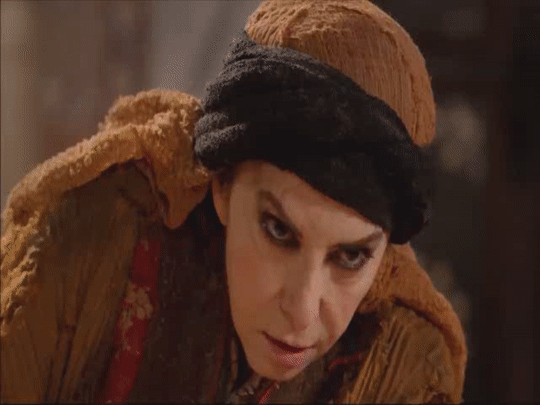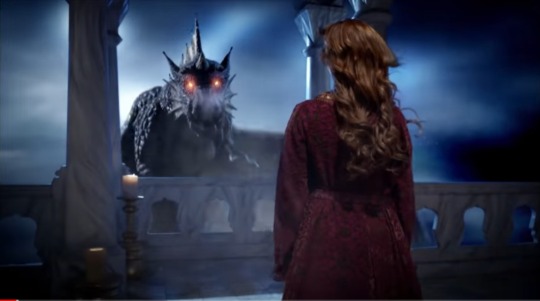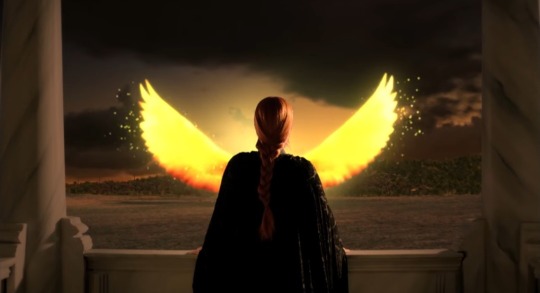#and hürrem's possible connection to the dragon is very interesting in my book
Explore tagged Tumblr posts
Text
While the prophecy in E46 is certainly not unequivocal and its wording can lead to many interpretations, I feel the show pointed that it was, ultimately, about Hürrem in the most ways.
Firstly, we have strong hints by the direction of the scene itself. When the fortuneteller says both "But there's a dragon living in the palace" and "The fish in the water will turn into a dragon with time", the camera zooms in on Hürrem. With the first line, it zooms in only on her before the next one comes. With the second line, the direction is still fixed on Hürrem until the fortuneteller mentions death.
Something similar occurs when the "There's death here" quote is uttered and right before the old woman starts fainting. We once again see only Hürrem's expressions prior to what happens next in both cases.
Hürrem's expressions are consistently shown before any reaction of the other people in the room. They're consistently more focused on. Right, this may be a coincidence: it could be just a part of the shock everyone was experiencing in the moment. And if Hürrem's reactions are a bit more focused on, it could be because she is the main protagonist; it would be a given for her reactions to it all to get more attention than the rest, in case they do. Right?
Then why does the fortuneteller seemingly shift her gaze at somebody at the end of her prophecy and the camera zooms right in on Hürrem again? This juxtaposition shot gets quite a bit of emphasis by the direction compared to everything else. It's not some insignificant "blink and you'll miss it" wonder, it's allowed to sink in for a little more before the prophecy is officially over. And I don't think that's accidental.

Secondly, Hürrem had a dream related to a dragon that burns ("overcomes") the enemy(-ies) in the next episode. That could very well be the same dragon the prophecy was referring to. That was the only time a dragon appeared in the series, the only time the prophecy was close to being called back to. And Hürrem's the only character who is somehow associated with a dragon, be it in a dream or anywhere else.

The dragon in the dream has to be connected to the dragon of the prophecy. Well, maybe it couldn't represent Hürrem since it appeared right in front of her and it didn't burn anyone around her in the dream, she herself was consumed by the flames. But again, what was related to the dragon of the prophecy? The end of the enemies. What is (especially S04) Hürrem's fatal flaw that "consumed her" to the point she thought her battle would be over after Mustafa's death and didn't pay so much attention to Selim and Bayezid's growing conflict? Her fixation on her enemies. The dream showcased Hürrem's fears most of all, but I'd argue these fears also play their part in triggering that fatal flaw. {The ambition of "defeating your enemies" is most explicitly attached to Hürrem out of all the characters. This is what her central goal is first and foremost and it seems to be the central goal of the dragon of the prophecy, too. Hürrem set out to overcome her enemies "one by one", just like the dragon eventually would. She's reminding herself of that objective as much as she's reminded of it by others - that's always an ongoing trend in her character arc.}
[In addition, the dream with the dragon delves into one of Hürrem's enormous inner vulnerabilities: the everlasting fear of her enemies getting hold on her permanently in a time where she's alone, with no one beside her. All this fits perfectly within the context of E47 where this precise sense of (understandable) panic and paranoia, the feeling that her own safety could be targeted in a time of a campaign because it's always happened before in some way, didn't only become a main theme of the episode... it became true, all her agitations turned out to be retroactively justified. Hence the symbolism of the dragon could be applied "in reverse" here: the harem riot Valide caused was "all over the castle", Hürrem was attacked with fire in order to be eliminated, but then she became stronger and slowly but surely made moves to strike back, along with fulfilling her own goal. Hürrem lives by a strong survival instinct: only one party goes down, it's either her or her enemies. She is aware of the likeability of her being the one to be taken down, the possibility of her enemies "burning" her, destroying her, the possibility of them "becoming the dragon" is always there, so she's the one who "becomes the dragon" instead. Hürrem turns into a dragon with time both overall and in the context of the post-E47 events in order to win the game, in order not to lose to them.]
Thirdly, Hürrem is infamously related to the fire element. She's the character with the most direct connection to fire. The dragon of the prophecy is a fire creature and it's precisely fire it uses to achieve its goals, which Hürrem also points to in her E63 monologue: she'll "rain as fire" over her enemies. (while this doesn't point exactly to the dragon, there is a connection nonetheless.)
Fourthly, the "fish in the sea" line doesn't have to be taken literally: perhaps it doesn't mean "one isn't an established power at all (until a later point in time)". The dragon is said to still be dormant, not necessarily powerless. The fortuneteller mentioned the dragon living in the palace before she went on with the "different form" and "fish in the sea" part. Hence, the dragon has a different form at the moment, but is still a dragon underneath. It simply hasn't completed its transformation yet. While it has a clear goal, the dragon could still be among the people in the room, still trying to resemble them. By this point, Hürrem indeed is still trying to adapt, both to the harem ways and where she currently is (like navigating the new circumstances that appear from this exact episode-onward: Mustafa becoming more of a threat. Hürrem has to be more careful than ever, she has to try to act like she's fine with what's surrounding her, to be "a fish in the sea" before she comes up with a strategy). She is still fighting off tradition. While the roots of that begin blossoming, she hasn't started to act against her enemies in full force yet. She hasn't reached her full power yet. She has a goal as clear as day from the start (which I feel the prophecy doesn't contradict), but the point where she gets more insistent against her enemies comes later on, "with time". With time she would be capable of defeating them completely.
[Also, "but such winds will blow..." could symbolize the external factors, the outside happenings that cause one's action. The outer motivations apparently aren't a small part of what makes the dragon overcome the enemies. And which character gets the most exploration of the outer motivations that lead her to become the person she would be in the future? Hürrem. Her dream with the dragon also points at something external that is cooking up against her that would only make her closer to reaching her full potential, overcoming all of them.]
Fifthly, while it's silly and absurd to blame Hürrem for all the death that would occur in the future, she still takes an active part of the battle of the throne and is an important contributor to the happenings of the castle. She brings that enormous change that is already there in another form and would propel forward what would come in the future. {And while the death is truly a major tying part to the dragon of the prophecy, I always saw the dragon as a part of the upcoming death, not the full causer of it. Judging by the words of the prophecy, both the dragon and the death reside. However, while death "lives" there, apparently already in its true form, the dragon would fully embrace itself later. That could mean the death is already set in stone before the dragon does much of anything. The many other factors are still there and there's no turning back. The death gets revealed after the dragon and that could separate it from the dragon somewhat. The later actions of the dragon (the "burning of the whole palace") that the fortuneteller describes aren't associated with death as much as they're associated with the overcoming of the enemy that could not only be a factor in causing death, but be provoked by death. ("The dragon will be all over the palace." - a consequence, is preceded by "The blue of the seas will turn into bloody red." - an external factor the dragon can both change and be changed by.)}
Sixthly, "The dragon will be all over the palace" part is maybe not necessarily tied only to the death it could potentially cause; it could signify Hürrem's impact, as well. All aspects of Hürrem's impact in the palace (since the dragon will be "all over" and affect stuff). I can name lots and lots of examples of internal and external impact, but the most egregious one for me is in E134: time literally stopped all around the castle after her death. That's how massive of an impact Hürrem has where's seemingly come to terms with all stages of her life, including the dragon.
《Hürrem was at her last stage in E134: the phoenix. The dragon and the phoenix both have appeared in Hürrem's dreams at different points of her life and have a possible wide connection. To start off, both can stand for impact. The dragon makes an impact for what it's done, while the phoenix makes an impact for its never quite ceasing existence, paralleled with Hürrem already being an enigma around the world in the end of S04: the phoenix is reborn from the ashes, so that alone makes it leave its mark on the world, a mark possibly building on the mark of the dragon. A path could also be marked from the "dragon" (the urge and power to overcome the odds/enemies going along with the fear of the odds/enemies overcoming Hürrem) to the "phoenix" (the direct and already complete rebirth of the self after all earthly struggles are nearing their end). Destruction of life vs renewal of life.》

Yes, the prophecy mostly points to a bad, destructive impact, but that shouldn't be only limited to Hürrem, even though she's the dragon. I think that's rather the consequences of all the fights in the palace, the status-quo of which Hürrem/the dragon undoubtedly shook. And the "every good thing comes to an end" cycle also includes Hürrem, just as Mahidevran said in E61. And what was that end exactly? The ever present death. Including Hürrem's own.
{EDIT: I feel the prophecy of E131 affirms what I said above even more. It professes namely death as the "last judgement" for everyone, with that death both reaching the dragon/Hürrem as well and extending beyond it. And the process would finalize itself only after she herself leaves the world, thus we have both the positive and negative sides of Hürrem's impact presented. She had a part in the events that would come to pass, but she's also the (last) pillar that delays them from playing out in their fullest, most brutal force.}
#the dragon could also signify the damage of brotherly or throne war itself sure#i wouldn't mind that at all#but i see lots of signs that the dragon is Hürrem#a big part of this post is quite theoretical yes#but the direction choices of the prophecy scene itself? that's the closest to the intention we could get imo#and hürrem's possible connection to the dragon is very interesting in my book#so here's this tangent of mine#magnificent century#muhteşem yüzyıl#muhtesem yuzyil#hurrem sultan
34 notes
·
View notes